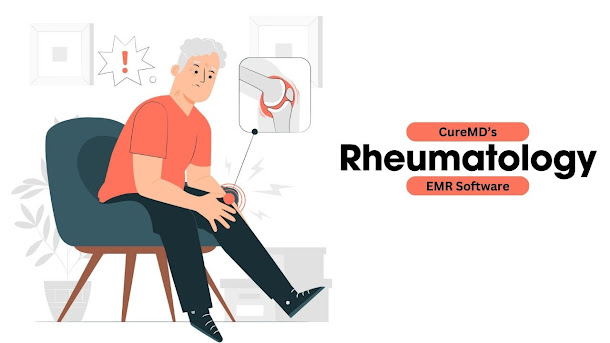Streamlining Rheumatology Practice: The Advantages of EMR Systems
In the ever-evolving landscape of healthcare, the
integration of Electronic Medical Records (EMRs) has revolutionized the way
medical practitioners manage patient information and care delivery. For
specialists in rheumatology, adopting a dedicated Rheumatology EMR system
brings forth a multitude of benefits, enhancing patient care, practice
efficiency, and overall productivity.
Enhanced Patient Care
Rheumatology, a field focusing on
musculoskeletal and autoimmune conditions, demands comprehensive and accurate
patient records. EMR systems specialized for Rheumatology streamline the
documentation process, allowing physicians to capture detailed patient
histories, track disease progression, and manage complex treatment plans
effectively.
Key Aspects for Patient Care
- Comprehensive Patient Records:
- EMR systems catered to Rheumatology ensure thorough
and detailed patient information storage.
- Streamlined Documentation:
- Simplifies and accelerates the process of recording
patient histories, symptoms, and treatment plans.
- Effective Disease Progression Tracking:
- Enables precise monitoring of disease development over
time.
- Management of Complex Treatments:
- Facilitates the organization and implementation of
multifaceted treatment plans for rheumatic conditions.
These systems often include templates tailored to rheumatic
diseases, facilitating precise and consistent documentation of symptoms, joint
assessments, laboratory results, and imaging reports. This structured data
organization not only assists in providing superior patient care but also
supports informed decision-making for treatment strategies.
Improved Efficiency and Workflow
Utilizing a Rheumatology-specific
EMR optimizes clinic workflow by automating routine tasks, reducing
administrative burdens, and enhancing communication among healthcare team
members. Features like appointment scheduling, automated reminders, and
prescription management streamline daily operations, allowing clinicians to
focus more on patient care and less on paperwork.
Moreover, interoperability among different modules within
the EMR system enables seamless access to patient data, facilitating quicker
consultations, and enhancing collaboration among rheumatologists, nurses, and
other specialists involved in patient care.
Precision and Analytics
Rheumatology EMR systems often
incorporate tools for outcome tracking and analytics. These functionalities
assist practitioners in monitoring disease progression, evaluating treatment
efficacy, and conducting research. By harnessing these analytics, clinicians
can adapt treatment plans based on real-time data and contribute to advancing
the understanding of rheumatic diseases.
The utilization of data analytics also promotes
evidence-based practice by providing insights into trends, outcomes, and
potential areas for improvement within the practice.
Integration with Medical Billing Software
for Small Businesses
For smaller rheumatology practices,
the integration of Rheumatology EMR with specialized Medical
Billing Software for Small Business brings added advantages. Streamlining
billing processes within the EMR system reduces errors, ensures accurate
coding, and expedites reimbursement cycles. This integration enhances financial
management, enabling practitioners to focus on delivering quality care while
efficiently managing the revenue cycle.
Benefits of Integrating Rheumatology EMR With
Specialized Medical Billing Software for Small Businesses
- Error Reduction in Billing Processes:
- Integration minimizes errors in billing procedures,
ensuring accuracy in coding and invoicing.
- Acceleration of Reimbursement Cycles:
- Streamlining billing within the EMR system speeds up
the reimbursement process for services rendered.
- Enhanced Financial Management:
- Integration supports better financial oversight,
aiding practitioners in effectively managing revenue cycles.
- Focus on Quality Care Delivery:
- Allows practitioners to dedicate more time to patient
care by automating and optimizing financial operations.
Conclusion
The adoption of Rheumatology EMR
systems brings a transformative shift in the management of patient information
and healthcare delivery within rheumatology practices. These systems not only
improve patient care, streamline workflows, and provide analytical insights but
also offer integrated solutions for small business needs like effective medical
billing. As technology continues to evolve, the seamless integration of EMRs
tailored for rheumatology will undoubtedly play a pivotal role in advancing the
field, benefiting both practitioners and patients alike.



Comments